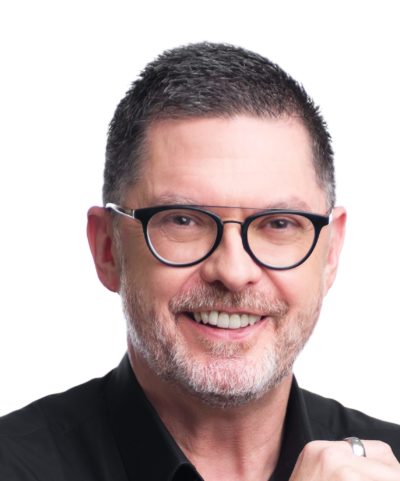Graham Abbott on Mozart 2020
- Season Highlights

Graham Abbott is one of Australia’s leading conductors and music educators, and his connection with the ASO goes back more than 30 years. He made his professional conducting debut with the ASO in Handel’s Messiah in 1987 and since that time he has conducted countless schools’ concerts, educational projects, family concerts, and mainstream concert programs with the orchestra. In parallel to his conducting, Graham is a regular pre-concert speaker for the ASO, and is the on-stage presenter for the Mozart at Elder series.
Mozart at Elder, 2020
Mozart is at the core of each program in the Mozart at Elder series, using the elegant yet powerful music of the great Amadeus as a springboard to explore connected, complementary or contrasting musical styles. The four programs in the 2020 season contain a number of important threads, with two of the four concerts directed by women, and a number of beautiful 20th century works which perfectly balance the music of Mozart.
Mozart at Elder 1 – Wed 8 April

Mozart Piano Concerto No.14
Arriaga Symphony in D
At the centre of the first program is Mozart’s Piano Concerto No 14, written when he was 28 and generally regarded as his first truly mature work in the form. It was written for one of his pupils, Barbara Ployer, and judging by the demands of the piano part she must have been a brilliant pianist.
The Swiss composer Arthur Honegger (1892-1955) is best-remembered today for his train-inspired tone poem Pacific 231. In this program, though, we open with his elegant chamber orchestra piece Pastorale d’été (Summer Pastoral). This is a musical impression of a peaceful morning in the Swiss Alps, a delicate miniature where every note is important and not a note is wasted.
The program closes with one of the most remarkable symphonies, written by a young man with strange parallels with Mozart. Hailing from the Basque region of northern Spain, Juan Crisóstomo Arriaga (1806-26) was born fifty years to the day after Mozart, and was an astonishing child prodigy. His only symphony dates from around 1824, just two years before his tragically early death. Arriaga’s symphony is a work full of promise, sadly unfulfilled.
Melbourne-based pianist Stefan Cassomenos is the soloist in the Mozart concerto, and the concert is conducted by the Swiss-Australian conductor Elena Schwarz.
Mozart at Elder 2 – Wed 11 August

Mozart Exsultate Jubilate
Haydn Symphony No.104 London
The second program in the series will be under the baton of the New Zealand-born conductor, Gemma New, principal conductor of the Dallas Symphony Orchestra. The soloist is one of the most respected and admired British sopranos, Carolyn Sampson.
The three works summarise the “First Viennese School”, with music by the three composers who represent the absolute heights of eighteenth century classicism.
Beethoven’s early ballet, The Creatures of Prometheus, dates from 1801. It opens with a stunning overture that has become a concert standard, an excellent example of Beethoven’s dynamic writing at the time he was creating his first two symphonies.
At the centre of the program is Mozart’s motet, Exsultate Jubilate, written in 1773. The solo motet, usually setting religious words, was a standard form of the Baroque; the best-known motets of this type are by Vivaldi. Mozart’s is one of the last examples of the form which is, in all but name, a concerto for voice and orchestra. The final movement of such works was invariably a virtuoso setting of the word Alleluia, and Mozart’s Alleluia is justly famous.
The program finishes with the last of Haydn’s symphonies, the twelfth symphony written for his two trips to London in the 1790s. While all twelve are known as Haydn’s “London” symphonies, this last work is also called his “London” symphony, a work full of infectious joy and drive which concludes a symphonic writing career spanning forty years.
Mozart at Elder 3 – Wed 7 October

Sibelius Rakastava
Mozart Concertone for Two Violins
Anton Webern (1883-1945) was one of the most important modernists of the early 20th century and his later music is rather abstract to some listeners. But this program opens with an earlier work which demonstrates Webern’s romantic origins. The Langsamer Satz (literally, “slow movement”) of 1905 was conceived for string quartet but is often played, as in this concert, by a full string orchestra. It grew out of an Austrian hiking trip with his cousin, Wilhelmine Mörtl, whom he would later marry, and the music is a sort of diary of his developing feelings for her.
The Finnish nationalist composer Jean Sibelius (1865-1957) is best-known for his tone poem Finlandia, as well as a series of seven magnificent symphonies, and a famous violin concerto. This concert, though, lets us hear a little-known work, a suite for strings, timpani and triangle called Rakastava. This piece, based on earlier choral settings for men’s voices, was often included in concerts conducted by Sibelius, as he noted it “captivated audiences”.
Finally, the program ends with a true rarity from Mozart himself. Mozart’s five violin concertos are well-known, well-loved parts of the repertoire (and there’s one in the next concert in this series), but his Concertone (literally, “big concerto”) for two violins is almost never played. Apart from the solo violin parts, there are major roles for the first oboe and the principal cello in the orchestra, and the result is a bold, happy work full of bright orchestral colours.
The solo violin parts will be played by the ASO’s Concertmaster, Natsuko Yoshimoto (who will direct the whole program) and Associate Concertmaster, Cameron Hill.
Mozart at Elder 4 – Wed 2 December

Mozart Violin Concerto No.4
Prokofiev Classical Symphony
Mozart at Elder for 2020 ends with three brilliant works showing the influence of the 18th century on later composers. The conductor will be Fabian Russell, who is based in Melbourne.
Igor Stravinsky (1882-1971) was one of the most important and influential composers of the 20th century. His Concerto in E flat, called Dumbarton Oaks, dates from the 1940s and is one the most famous “neoclassical” works in the repertoire. Stravinsky himself said it was written in the spirit of Bach’s “Brandenburg” Concertos, and it’s certainly a dazzling example of old-meets-new.
Brilliant Australian violinist, Emily Sun, joins the orchestra as the soloist in Mozart’s fourth violin concerto, dating from 1775. She was named ABC Australian Young Performer of the Year in 2018 and has already developed an enviable reputation both here and overseas.
If Stravinsky’s Dumbarton Oaks was Bach meeting the 20th century, then the Classical Symphony of Sergei Prokofiev (1891-1953) is an expression of the composer’s fantasy as to what sort of symphony Haydn might have written in modern times. Completed in 1917, the Classical Symphony is a dazzling showpiece, keeping every member of the orchestra on the edge of their seats, and bringing Mozart at Elder for 2020 to a glittering close.
